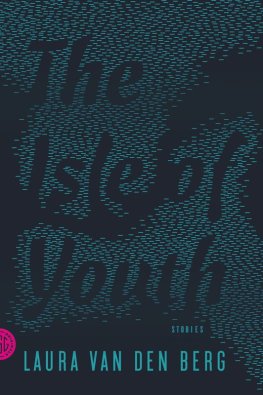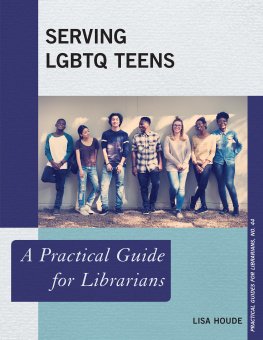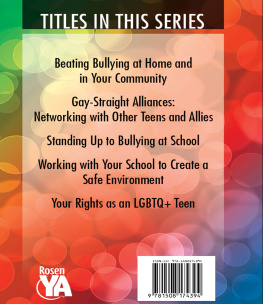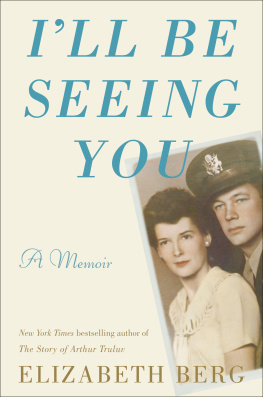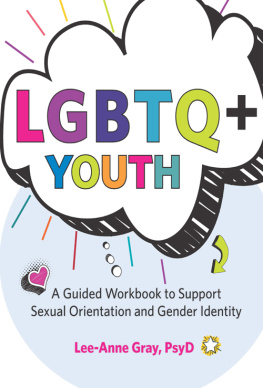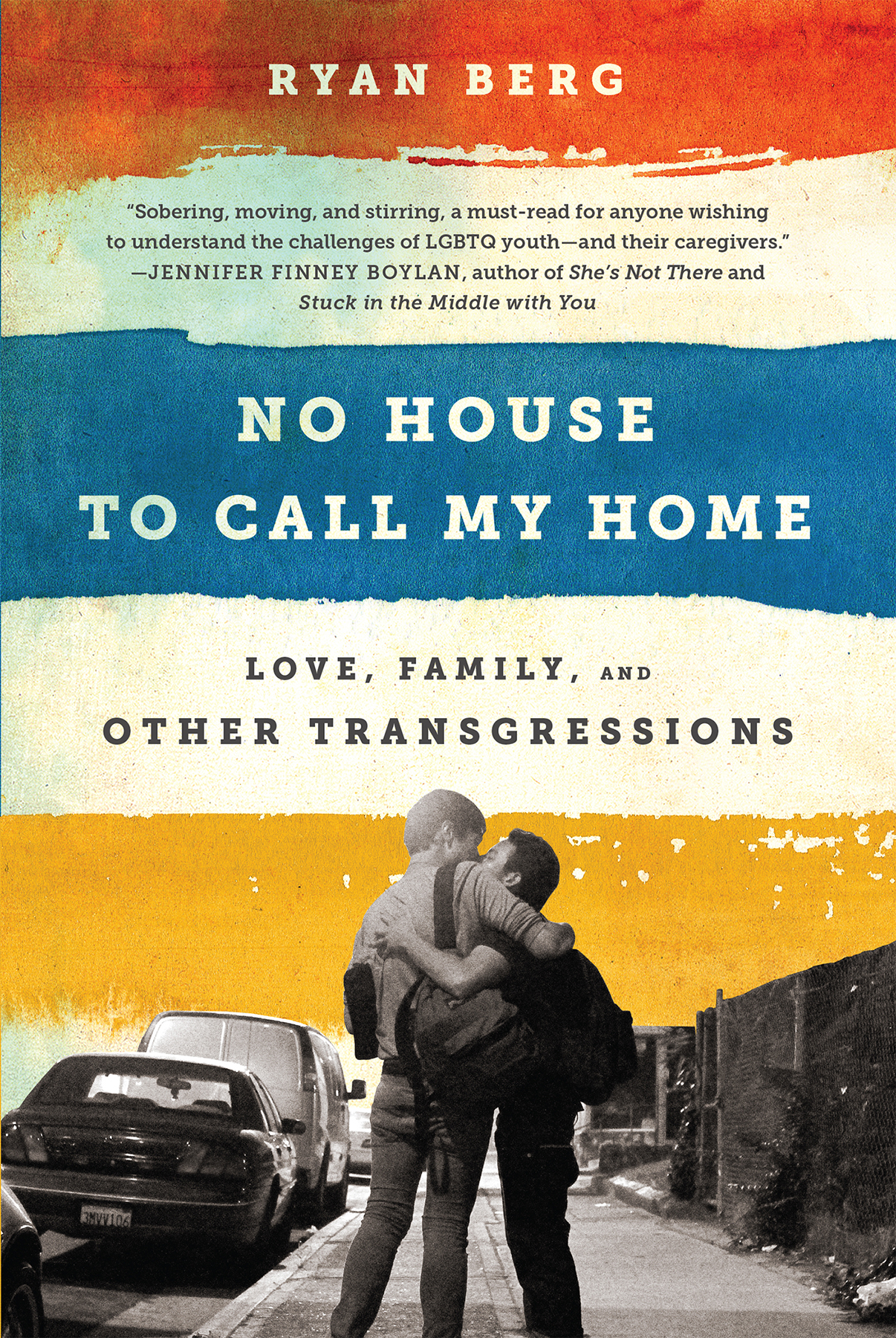No House
to Call My Home
Love, Family, and
Other Transgressions
Ryan Berg
Copyright 2015 by Ryan Berg
Cover design by Pete Garceau
Cover photograph Christina House
Cover copyright 2015 Hachette Book Group, Inc.
Hachette Book Group supports the right to free expression and the value of copyright. The purpose of copyright is to encourage writers and artists to produce the creative works that enrich our culture.
The scanning, uploading, and distribution of this book without permission is a theft of the authors intellectual property. If you would like permission to use material from the book (other than for review purposes), please contact permissions@hbgusa.com. Thank you for your support of the authors rights.
Bold Type Books
116 East 16th Street, 8th Floor New York, NY 10003
www.boldtypebooks.org
@BoldTypeBooks
Printed in the United States of America
First Edition: August 2015
First Trade Paperback Edition: August 2016
Published by Bold Type Books, an imprint of Perseus Books, LLC, a subsidiary of Hachette Book Group, Inc. Bold Type Books is a co-publishing venture of the Type Media Center and Perseus Books.
The Hachette Speakers Bureau provides a wide range of authors for speaking events. To find out more, go to www.hachettespeakersbureau.com or call (866) 376-6591.
The publisher is not responsible for websites (or their content) that are not owned by the publisher.
Print book interior design by Jack Lenzo
Library of Congress Cataloging-in-Publication Data
Berg, Ryan, 1974
No house to call my home : love, family, and other transgressions / Ryan Berg.
pages cm
Includes bibliographical references and index.
ISBN 978-1-56858-509-3 (hardback) ISBN 978-1-56858-510-9 (e-book) 1. Berg, Ryan, 1974- 2. Sexual minority youthServices forNew York (State)New York. 3. Sexual minority youthCounseling ofNew York (State)New York. 4. Gay teenagersServices forNew York (State)New York. 5. Gay teenagersCounseling ofNew York (State)New York. 6. Group homes for youthNew York (State)New York. 7. Residence counselorsNew York (State)New York. I. Title.
HV1426.B47 2015
362.786092--dc23
[B]
2015011424
ISBNs: 978-1-56858-568-0 (paperback)
LSC-C
10987654321
E3-20190125-PDJ-PC-COR
For M. S., R. J. P., and G. B.rest in power
For the youth
Contents
Navigation
T his book is a work of nonfiction, not journalism. I did not record conversations, conduct interviews, or have access to documents as I was writing it. The people in this book are real. Dialogue was re-created from memory or retrieved from notes I took after the conversations took place. I changed certain details to protect the identities of the youth I worked with. The names of the youth as well as their physical characteristics have been altered to preserve the anonymity of all involved. Names of organizations have also been changed. Writing attributed to others was altered for grammatical clarity. While the storytelling and the lens I look through are mine, my goal is to remain true to the experiences of the youth I worked with while honoring their privacy.
Perhaps home is not a place but simply an irrevocable condition.
James Baldwin
Home is an idea rather than a place. Its where you feel safe. Where youre among people who are kind to you and if youre in trouble theyll help you. Its community.
Toni Morrison
Lesbian, gay, bisexual, transgender, and questioning (LGBTQ) youth, in particular, face significant prejudice and discrimination in foster care. Many queer-identified young people, who are disproportionately represented in the system, report intolerance, physical and emotional mistreatment, or neglect by caregivers or peers. LGBTQ youth are more likely than their heterosexual counterparts to be placed in group homes. An overwhelming majority of those youth in group homes have been victims of violence . The Opening Doors project, which provides tools and resources for the legal and child welfare community, highlights the following statistics: 70 percent of LGBTQ youth in group homes reported violence based on LGBTQ status; 100 percent reported verbal harassment; and 78 percent of youth were removed or ran away from placement because of hostility toward their LGBTQ status. These pervasive negative experiences can have a significant impact on mental health and emotional growth. Until recent years, child welfare agencies neglected to provide accurate policy, best practices training, and guidance for workers or foster parents serving LGBTQ youth. Without cultural competency training around LGBTQ issues, the result has been retraumatization, continued abuse, and prolonged rejection for many young people.
African American youth are also more often given psychiatric medications for contentious behaviors, diagnosed with a mental illness, and sent to juvenile facilities; white youth with the same forceful behavior are more likely to be treated as outpatients and released. The disparities are everywhere, from the way doctors describe identical physical injuriesAfrican American youth experience greater incidents of abuse, while their white counterparts experience accidentsto the way police departments handle marijuana possession (black people are nearly four times more likely than white people to be arrested for marijuana possession, despite similar usage rates). Such actions prompt calls to Child Protective Services. As a result, many youth of color find their entry point into the school-to-prison pipeline through foster care.
These problems will persist until we wake uplocally, nationally, and morallyand give a hard, steady look at what is causing them, and then take action to address them.
In early 2004 I began working as a residential counselor and subsequently as a caseworker for an LGBTQ foster care program in New York City. The program was made up of two group homes: what I call the 401, located in Queens, and Keap Street, in Brooklyn. For me, doing this work was a way to re-engage with the world, to give something back. I started as a residential counselor, an entry-level position requiring a high school diploma and a clean record. The job responsibilities included providing on-site direct care to the youth in the group home, prompting them to do chores like cooking and cleaning, helping manage conflicts, and engaging them in healthy activities. As a caseworker I was tasked with goal setting, coordinating services, and monitoring the progress of the youth in the program. The aim is to reunify them with family or provide them with the tools to live independently.
I found myself wholly unprepared for the myriad personal and social issues I would be forced to confront. Thrown headfirst into the work, I found my understanding of racial and economic justice, gender identity, crime, and poverty was challenged at every turn. Facing the realities of these youth on a daily basis deepened my understanding of privilege, social responsibility, and community, and ultimately altered my understanding of myself.
While doing this work I learned the statistics. The data point out a litany of troubling risk behaviors. LGBTQ youth are more likely to use and abuse substances, and they experience sexual abuse, violence, and clinical depression at greater rates than the general population. Research indicates that LGBTQ youth are more than twice as likely to attempt suicide as their straight peers. Risk-taking is typical in adolescence. Couple that with the isolation and rejection many LGBTQ youth face, and self-destruction becomes the modus operandi. Leaning on unhealthy ways to cope with trauma can become habitual, and youth with self-destructive tendencies are more likely to become adults with self-destructive addictions. In trying to show the youth alternatives to sex work, attempting to break their cycles of drug and alcohol abuse, and help build their self-esteem, I was reminded of my own litany of risk behaviors, my own struggle as a young man grappling with identity, and my own tendency to seek solace in drugs, alcohol, and sex in order to mask the pain felt from micro-aggressions and internalized homophobia.


